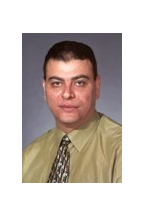Ehab El-Saadany

Contact information
Website
Ehab El-SaadanyPower Energy Systems Group
Biography summary
Ehab El-Saadany is an Electrical and Computer Engineering Professor and a member of the Power and Energy Systems Group at the University of Waterloo.
Professor El-Saadany’s research areas of interest include performance evaluation and control of distributed systems with high penetration levels of distributed generation, smart grids operation and control; and analysis and control of wind based distributed generation. He is also interested in the development of new control algorithms for the distributed generation interface in grid-connected and micro-grid systems.
Professor El-Saadany’s research work also involves the monitoring, identification and classification of power quality issues in distributed systems with emphasis on smart grid applications and the utilization of distributed generation as a tool for power quality and voltage stability improvement.
In addition to his many accomplishments, Professor El-Saadany was the recipient of the Early Researcher Award Province of Ontario in 2007. He is a co-holder of three patents, as well as a senior member of the IEEE and a referee and reviewer for various journals and conferences. In 2009 Dr. El-Saadany received the Canada Research Chair (CRC) award for his work on Distributed Generation integration and in 2014 Dr. El-Saadany received a second CRC for his innovative work on Smart Distribution Systems.
Research interests
- Distribution systems operation and control
- Distributed generation
- Sustainable energy
- Power electronics interfacing
- Power quality issues
- Planning and optimization
- System reliability
- Energy Systems
- Power systems
- Renewable energy
- Smart buildings
- Smart communities
- Smart Distribution Systems
- Power Quality
- Microgrids
- Fuel cell interfacing
- Mechatronics
- Microelectromechanical systems (MEMS) Micro-power generators
- Cybersecurity
- Infrastructure integrity
Education
- 1998, Doctorate, Electrical Engineering, University of Waterloo
- 1990, Master of Science, Electrical Power and Machines Engineering, Aim Shams University
- 1986, Bachelor of Science (BSc), Electrical Power and Machines Engineering, Aim Shams University
Courses*
- ECE 6603PD - Electromagnetic Compatibility and Power Quality
- Taught in 2020
- ECE 6604PD - Distributed Generation
- Taught in 2019
* Only courses taught in the past 5 years are displayed.
Selected/recent publications
- Hamad, Amr A and Azzouz, Maher Abdelkhalek and El-Saadany, Ehab F, Multiagent supervisory control for power management in DC microgrids, IEEE Transactions on Smart Grid, 7(2), 2016, 1057 - 1068
- Zidan, Aboelsood A and Shaaban, Mostafa F and El-Saadany, Ehab F, Impacts of Feeder Reconfiguration on Renewable Resources Allocation in Balanced and Unbalanced Distribution Systems, Electric Power Components and Systems, 2016, 1 - 16
- Mahmoud, Yousef and Abdelwahed, Mohamed and El-Saadany, Ehab F, An Enhanced MPPT Method Combining Model-Based and Heuristic Techniques, IEEE Transactions on Sustainable Energy, 7(2), 2016, 576 - 585
- Akhavan-Rezai, Elham and Shaaban, Mostafa F and El-Saadany, EF and Karray, Fakhri, Online intelligent demand management of plug-in electric vehicles in future smart parking lots, IEEE Systems Journal, 10(2), 2016, 483 - 494
- Mahmoud, Yousef and El-Saadany, Ehab F, Fast power-peaks estimator for partially shaded PV systems, IEEE Transactions on Energy Conversion, 31(1), 2016, 206 - 217
Graduate studies
- Currently considering applications from graduate students. A completed online application is required for admission; start the application process now.